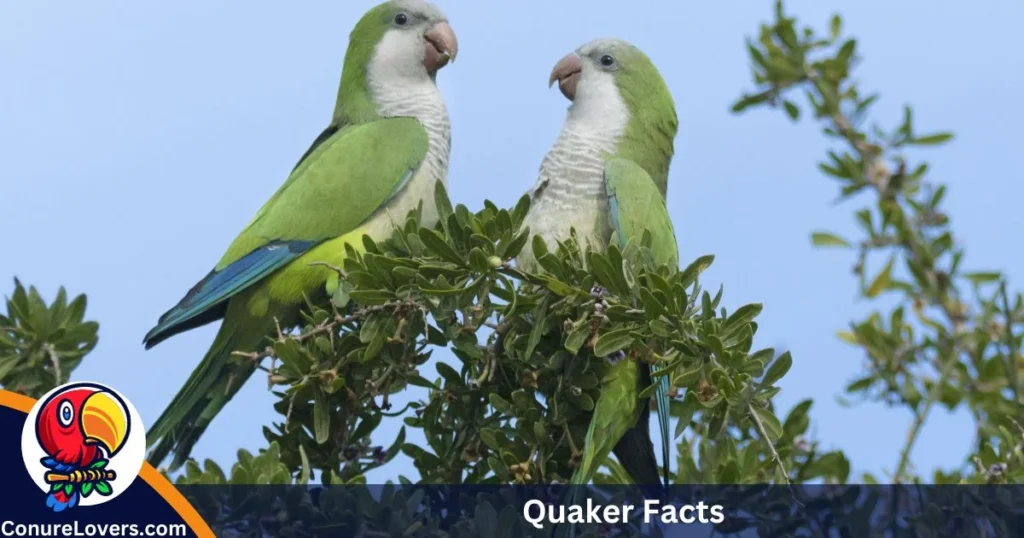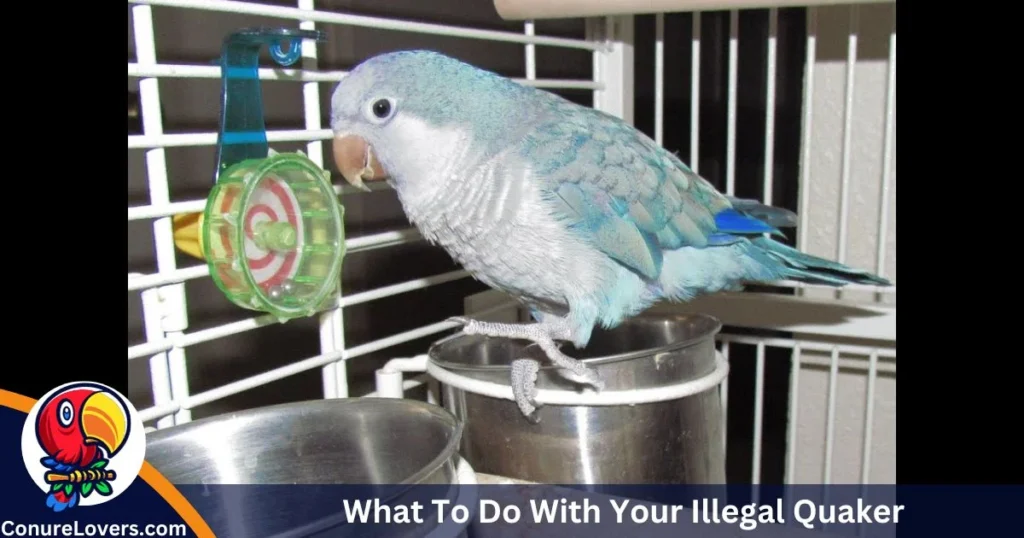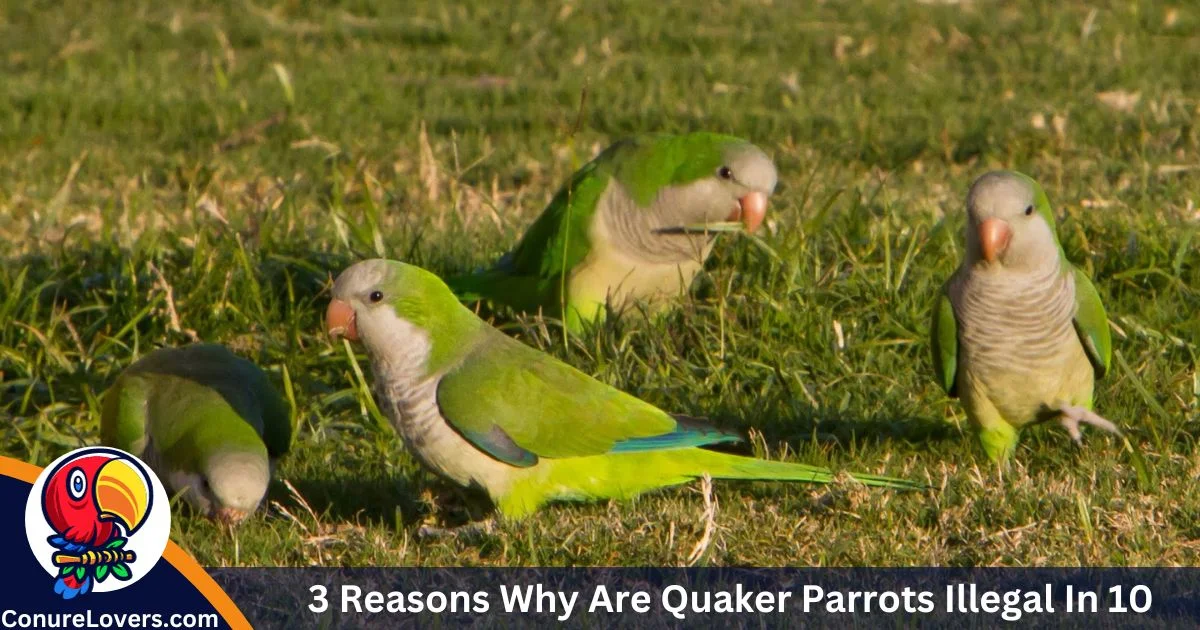Why are Quaker Parakeets Illegal in some States?
- Agricultural Threat: Some states don’t allow Quaker Parakeets because they are seen as a danger to crops and farms.
- Threat to Native Birds: These parakeets can also pose a threat to other local bird species.
- Noise and Safety Concerns: Quaker Parakeets can be noisy, and there are concerns about their impact on safety.
- Health Worries: There are also worries about the health risks associated with having Quaker Parakeets in certain areas.
Quaker Parrots Illegal In 10 States,These states are California, Connecticut, Rhode Island, Colorado, Wyoming, Georgia, Hawaii, Pennsylvania, Kentucky, and Kansas.
Quaker parrots can be a problem because they multiply quickly and make large groups where they find food and safety. This can harm local animals, crops, and structures. That’s why 10 states have rules against owning, breeding, selling, or releasing them.
So, Why Are Quaker Parrots Illegal?
Quaker parrots can be a problem for local animals, crops, and structures because they reproduce a lot and can easily form large groups where they find food and safety. That’s why 10 states have rules against owning, breeding, selling, or releasing them.
Agricultural Threats
Quaker parrots don’t stick to a particular time for mating, so they can mate and breed all year long. Just picture how many parrots a pair can produce in just one year. A large population of these Quaker parrots can lead to a significant loss, reaching more than 45% of crops and agricultural products. This has occurred in South America and continues to happen today.
Danger To Native Species
Also, Quaker parrots can be a problem for local birds and animals by attacking and kicking them out of their usual areas and homes. This can mess up the balance in nature and affect the well-being of other wildlife in those places.
Infrastructure losses
And there’s more to it. Quaker parrots tend to gather in big groups, forming extensive colonies. They might settle on delicate rooftops or churches, potentially causing financial losses due to their activities.
Read Also: Can Parrots Eat Dairy Products – Safe or Toxic?
Quaker Facts

Quaker parrots come from the middle of South America, specifically the forests of Bolivia and Brazil. They’re known for forming large colonies with hundreds or even thousands of members. In the southern United States, you can find them living in wild colonies, and because they feed on crops and nest in delicate places, they can cause significant losses to nearby farms and communities.
This unique nesting behavior, creating huge colonies with multiple rooms and chambers, is exclusive to this species. Some states have banned Quaker parrots due to the mentioned threats. Despite restrictions, they remain one of the most popular parrot breeds worldwide.
This breed, also known as Quakers, parakeet parrot, or monk parrot, has the scientific name Myiopsitta monachus. With proper care, they can live up to 30 years, while in the wild, their lifespan may be around 20 years or less.
Quakers are excellent talkers, capable of memorizing a wide range of words and mimicking various human sounds. They are energetic birds that need attention from their owners. Providing them with toys or allowing them to play with water can keep them happy and satisfied.
Where Is it Legal to Own a Quaker Parrot?
In many states, like Utah, Washington, Texas, and others, you can have a quaker parrot without any special rules. However, in Ohio, it’s recommended to clip the parrot’s wings to prevent it from flying away.
New Jersey and New York have their own criteria for owning a quaker. In New Jersey, you need to provide official papers to the Fish & Wildlife Division. In New York and Virginia, owners are required to either tie the quakers or keep them indoors.
Apart from being banded, Vermont mandates that every type of parrot must be micro-chipped or have some form of identification indicating the breeder.
What To Do With Your Illegal Quaker

If you find yourself with a quaker in a state where it’s not allowed, it’s really important to keep it from flying away. States like California, Connecticut, Rhode Island, Wyoming, Georgia, Hawaii, Colorado, Pennsylvania, Kentucky, and Kansas don’t let people own, sell, or breed quaker parakeets.
In some places, they won’t even let your parrot see a vet, and in places like Pennsylvania, they might have to put your parrot to sleep.
Considering this, you should decide what to do with your quaker. If you care about it and want it to be safe, find it a new home in a state where it’s allowed. You can reach out to people, organizations, or pet stores that might be interested in buying it from you.
If you decide to keep your quaker, be aware of the risks and make sure to keep its wings clipped. Don’t let it fly around even if you’ve trained it to come back. Animals, including parrots, can be unpredictable and might fly away and never return if something scares them while they’re flying.
Also, be ready to keep your quaker indoors all the time. Since quakers are energetic, they need things to keep them busy. If you have to go out, leave it with toys and a water fountain to keep it entertained.
FAQ
The illegal States to have a quaker:
The states of California, Connecticut, Rhode Island, Colorado, Wyoming, Georgia, Hawaii, Pennsylvania, Kentucky, and Kansas prohibit their residents from owning, selling, or breeding quaker parrots.
Are Quaker Parrots Legal In Florida?
Yes, owning and breeding quaker parrots in Florida is legal with no restrictions.
Are Quaker Parrots Illegal In Texas?
No, owning, selling, or breeding quaker parrots in the state of Texas is totally unrestricted.
Are Quaker parrots illegal in the US?
No, Quaker parrots are not illegal in the entire United States. However, specific states may have regulations or restrictions on owning, selling, or breeding them.
Why are quaker parrots illegal in Pennsylvania?
In Pennsylvania, Quaker parrots are considered invasive species. Concerns include potential threats to agriculture and native wildlife. Due to these reasons, the state has imposed restrictions on owning, selling, or breeding Quaker parrots.
Why are quaker parrots illegal in NJ?
New Jersey also considers Quaker parrots as potentially disruptive to the local ecosystem. To address this concern, the state has implemented regulations, and owners must provide official papers to the Fish & Wildlife Division to legally own a Quaker parrot.
What problems do Quaker parrots have?
Quaker parrots can pose issues in regions where they are not native. They have a high reproductive rate, form large colonies, and may negatively impact local wildlife, agriculture, and infrastructure. Their adaptability to various environments can lead to challenges in managing their populations, leading some states to regulate their ownership.

Nicholas Clark here, your Easy Conure Care Guide at “Conure Lovers.” I’m here to simplify conure care for you. Let’s navigate the basics together, ensuring your feathery friend enjoys a colorful and chirpy life.












